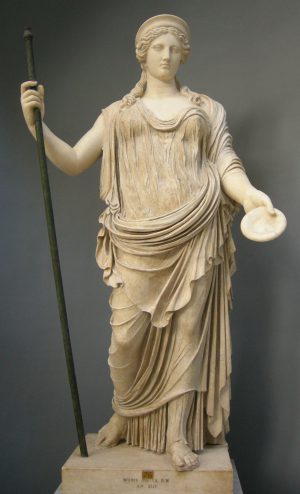Hera 103
 Hera was the Queen of the Gods, sister and wife of Zeus, Greek goddess of women, childbirth and marriage. Her story is predominantly a continuing cycle of betrayal by Zeus, followed by Hera seeking vengeance on his illicit partners and by-blows.
Hera was the Queen of the Gods, sister and wife of Zeus, Greek goddess of women, childbirth and marriage. Her story is predominantly a continuing cycle of betrayal by Zeus, followed by Hera seeking vengeance on his illicit partners and by-blows.
Hera at first refused Zeus’ offer of matrimony, but the wily seducer was aware of her soft spot for animals in distress. Crafting a ferocious thunderstorm, Zeus transformed himself into a cuckoo, and perched on Hera’s window, pathetically tweeting in fear. Hera opened the window to rescue him, took him to her bosom to comfort him, whereupon he resumed his true identity and ravished her. Ashamed of this loss of her maidenhead, Hera agreed to become his wife. Their children were Ares, god of war; Eris, goddess of strife; Hebe, cupbearer to the gods; and Hephaistos, the lame god of the forge.
Hera was well aware of her husband’s wandering eye, and tried to keep a leash on him, to no avail. Zeus, confidently afraid of nothing, was nevertheless terrified of her tirades and went to great lengths to keep his extramarital affairs secret, but Hera always spied him out. Like many mistreated wives, Hera frequently blamed her husband’s infidelities on his paramours, and her vindictiveness in punishing them and their children was legendary. She was particularly vengeful toward Heracles, whose birth she attempted to prevent by twisting his mother’s legs into knots. Next she tried to kill him in his cradle by sending two serpents to do the deed, but even the infant Heracles was so strong that he merely throttled them with his bare hands, then used their corpses as playthings. Hera’s enmity toward Heracles continued throughout his life, and she attempted to make each of his famous twelve Labors as difficult as possible.
Astrologically, Hera represents marriage and childbirth; jealousy and score-keeping; vindictiveness; determination; an unfaithful spouse; fairness and equality in relationships; and fears of abandonment.
